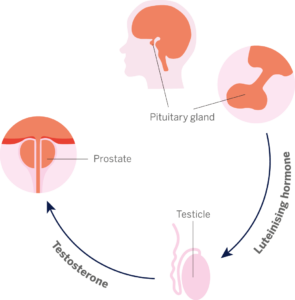What is locally advanced prostate cancer and how is it treated?
The spread of cancer is described here. When cancer has spread through the capsule of the prostate or the seminal vesicles (T3) or into the surrounding structures (T4), it is called locally advanced prostate cancer. Men with locally advanced prostate cancer have a higher risk that cancer cells may have already spread.
You may be offered other treatment to kill any cells that could have spread beyond the prostate. You may be offered radiotherapy treatment to include the surrounding structures (as well as the prostate), usually in combination with two to three years of hormone therapy. Hormone treatment can delay or prevent the cancer coming back in other places and is given by tablets or injections.
Some men with locally advanced prostate cancer are treated with hormone therapy alone. The choice depends on factors that you will discuss with your doctor.
There are two types of hormone treatments that can be used to treat locally advanced prostate cancer:
- Luteinising hormone-releasing hormone (LHRH ) agonists or Gonadotropin-releasing hormone (GnRH) antagonists given by injection
- Anti-androgens given by tablet
